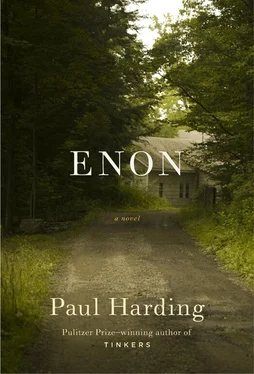The man at the cash register looked like he might be from India or Pakistan or somewhere on the subcontinent, as I thought of it. He was my age, I supposed, and had short, straight hair and a thick mustache. He wore old gray pants and a tan sweater vest over a plaid shirt. I smiled and nodded at him, and halfway said hi to him, but it sounded more like “Huh” or “Ha.” He didn’t smile back but nodded at me once, not unfriendly, just serious. I didn’t want to dither, because I knew I looked sketchy. I had never bought my coffee or my cigarettes here and although I was a native of Enon, to this man I was a stranger who could have been from anywhere. I figured I’d buy three or four of the largest coffees they had, black, and take them back to the house and keep them in the refrigerator and heat them up in a saucepan each morning. I looked at the cashier again and smiled.
“I drew the short straw, man,” I said, surprising myself by the lie. A sudden, made-up story sprang into my mind, of me being on a painting crew and somehow having lost some kind of bet to determine who had to fetch and pay for coffee before work. I could even see the guys I was working with, and imagine the cramped pickup truck cab we were all stuffed into, bleary, smoking, irritable, one or two of the guys already draining nips of vodka and tossing the little plastic bottles out the window into people’s front yards.
“I’m the sap who has to get the joe today. And pay for it,” I said. The man at the register did not change his serious expression.
“Yes,” he said. I lifted a twenty-four-ounce coffee cup from the top of the stack.
“This the largest size?” I asked. “These guys are coffee freaks.”
“Yes,” the man said. The urge to fling the cup and run out of the store seized me, and the cup did skitter out of my hand, across the counter, and drop onto the floor. I stooped to pick it up and dizziness swept through my head. I was suddenly mortified by the fact that I had not spoken to another person for nearly a month, and that I was high and drunk every waking moment, and that I was so discombobulated all the time that what I considered to be my relatively clearheaded state at the moment might seem to any normal person the brink of a coma. I grabbed the edge of the counter and took a breath and pulled myself up.
“Mondays, man,” I said to the man at the register. He frowned and stepped down off the cashier’s island and came toward me. I was placing the cup I’d dropped on the floor under one of the carafes. As the man took the cup from my hand and tossed it into the plastic trash barrel next to the counter, I saw that I had been about to serve myself something called vanilla cinnamon hazelnut coffee. The man took a clean cup from the stack and put it under the coffee dispenser.
“No, no, man,” I said. “You saved me. I don’t want that crazy sweet stuff.” I winced at myself for calling him “man.”
“What do you want?” the man said. He was clearly anxious to see me out of the store. “And,” he said, “it is not Monday. It is Sunday.”
“Sunday,” I said. “Sunday, Sunday.” I tried to sound humorous, resigned in the way that people who have terrible jobs with too many hours and awful pay use to try to keep their spirits up. “Work so much I can’t remember what day it is. Terrible that us stiffs have to work on Sundays, isn’t it?”
“What would you like?” he said.
“Oh, four. Four large of whatever dark roast stuff you have, without any flavors.”
“The French roast,” he said. He lifted a carafe with a laminated card taped to it that read PARISIAN CAFÉ, NOIR! and raised and lowered it by the handle to test how much coffee was left. “There is not enough for four. You will—” I could not understand what he said after. I lost the English words in the accents and syntax of his first language.
“I’m sorry, man,” I said, now so irritated with myself at saying “man” that I just wanted to storm off with neither coffee nor smokes; I didn’t deserve them because I kept calling this guy “man” and I couldn’t even understand what he was saying. “I’m kind of half out of it this morning,” I said. “What?”
He repeated himself and I still could not understand. It sounded like he was saying something about how I would not find any of the sort of coffee I wanted available for my friends, but also like there wasn’t any left in the whole world, or something like that, which I knew was wrong. It was upsetting to listen so closely and just not be able to understand the guy. I felt like I was insulting him. I winced and shook my head, trying to show him I was sorry, but it just wasn’t getting through my thick skull, it was all my fault. He repeated himself, but I still could not understand a word he said. I felt like I was in a weird dream, like it was just a matter of paying closer attention, but that I couldn’t get myself to concentrate.
Embarrassed as I was, I knocked on the top of my head and said, “Oh, brother, I’m so sorry; I just can’t understand a word. You know, I’ll just get four cups full of whatever’s made and the guys can just like it or—”
He put a hand up and said, “No.”
I said, “No—”
“No,” he said again. He folded his raised hand so just the forefinger stuck up. “Wait.”
“Oh, no, man; it’s okay; it’s fine. You don’t need to—”
“Wait.”
I nodded. He tested the other carafes in the rack and picked up three of them and walked into the back room. Although he was clearly irritated, he did not hurry. I looked outside, worried that someone would pull up and come in while he was out back. The weather was changing. The sharp, blustery cold from overnight looked like it was being pushed away by warmer, billowy winds that seemed to be turning the dew in the grass to fog before my eyes. The meadows behind the stone walls across the street, at the end of the Tucker estate development, seemed to be steaming. While he was rummaging around in the back I looked at the items for sale near the cash register — pens with lights in them, beef jerky, car air fresheners. The cigarettes were stored in an overhead rack, in push trays, above the counter. Taped to the rack, facing out toward where the customers stood to pay, were two photographs, one of a boy about two years old, one of a girl around eight, I guessed. I leaned in toward the picture of the girl. She was dressed in a blue sari and there was a white flower in her hair. Her hair was dark and braided and very long. The braid was draped in front of her, over her shoulder, and reached below her waist. I thought she must never have had her hair cut. From the size and shape of her hands and her cheeks, I decided that, yes, she was in second grade, or whatever the equivalent was in what I now guessed must be India, given what I thought was her Indian sari. Kate had looked like that when she was eight, skinny, getting taller, but still almost somehow like not a baby or a toddler but what Susan and I had always called a little kid, as distinguished from a big kid. “Ooh, look at you!” I’d say to Kate and scoop her up in a hug and kiss her cheeks and ears and head. “You’re almost a big kid!”
The man came from the back of the store, lugging four carafes of coffee. He hoisted them onto the counter.
“I made you an extra amount of the French roast,” he said, slowly, as if speaking to a dull child. I was afraid that he was going to help me fill the cups, but he replaced three of the carafes in the rack and left the fourth one on the counter and returned to behind the register, beneath the racks of cigarettes.
I began to fill the cups. The pumps on the carafes squeezed out only a couple of ounces of coffee at a time, so I had to keep pumping — almost, I imagined, like the old well water pumps people used to have in their yards. As I pushed on the pump, I nodded toward the photographs.
Читать дальше












